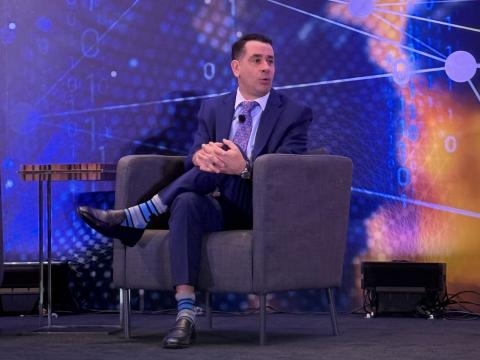Management Efforts Improving Homeland's Success
The Department of Homeland Security (DHS) is evolving from its early component focus to today’s mission focus, and its unity of effort and management reform initiatives serve as a foundation for continued transformation.
“One of the key things in unity of effort is we have to get it right up front," explained Chip Fulghum, deputy under secretary for management, DHS, at the AFCEA Homeland Security Conference. DHS must build strategy that turns into operational plans, he said, but he allowed that the Department has a ways to go. “Requirements are being built from the ground up, and we want to eliminate redundancy.”
“Flat is the new up for resourcing,” he stressed, adding, “We have to get the most out of every dollar." Nevertheless, despite the progress that has been made, the Department’s budget is still fragmented he acknowledged, and other department leaders have reported that information technology systems remain stove piped.
Fulghum points to several strategies that must continue to help with those challenges. First, resourcing and acquisition need to link up, but the challenge is that one is calendar driven by the fiscal year, and one is not, he said.
“We must have industry engagement by participating in events like this,” Fulghum stressed as he addressed attendees. Acquisition innovation round tables also solve real problems. “We listen to industry about the challenges and frustrations, especially about getting people cleared so they can do their jobs,” he added. The four reverse industry days the Department has sponsored have allowed companies to explain what thought and criteria they use in determining if they want to bid on work.
The Procurement Innovation Lab, or PIL, "helps us to put our toe on the line every day. This effort enables us to use the rules to our advantage to allow as much flexibility as possible. Flash and speed dating and video presentation have resulted in many innovative ideas we need to build on," Fulghum said.
Two-thirds of major acquisitions in DHS are information technology related, which requires speed. “Right now our procurements take too long and cost too much. Let's not just look at agile but look at whole ecosystems,” he recommended.
Some strategies include reducing documentation and timeline and developing better metrics to show business value.“We are not great at that, and need industry help,” he said. “We need to work together.”
Agile incremental development is old news, and DHS knows how to do it, he said. “But we have to get the tools in place to go get it.” Cost estimates take too long as well, he allowed.
The management reform initiative is addressing DHS’s delivery of products and services. It questions if the Department should be in a particular business, such as should it be moving to software as a service or endpoint as a service? It examines why there are multiple network operation centers and it explores options, such as obtaining world class cybersecurity as a service.
In addition to the initiatives under way, Fulghum emphasized, “We need smart buyers of IT. We need acquisition professionals. We need HR people to do hiring. And we are hiring. If you're looking for a change and a place to serve in the best department in the federal government, we are waiting. Go to usajobs and look,” the deputy under secretary reported.
In acknowledging the importance of human capital, Fulghum related that it is not just the Coast Guard or the 190,000 civilians in DHS who are protecting our nation. It is the men and women who provide contractor support each day. “We cannot do our mission without them, and we appreciate and value that partnership. On behalf of the Department, we thank industry for helping us keep our nation safe and secure and combat the challenges we face every day,” he concluded.





Comments